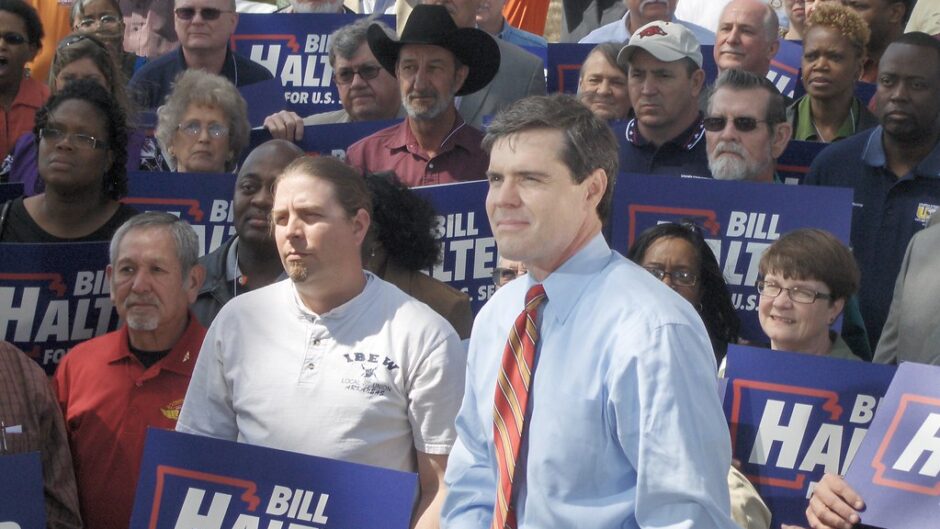There are several pretty important party primaries (and one special election) tomorrow around the country. Well, not important insofar as they’ll have any real impact, but important because they’ll guide the narrative leading to election day in November. Each party will see what messages worked, where the mood of the country is and is heading, and, probably less importantly, how big of a role the tea partiers can have in the election.
I’ve been paying attention to most of the races since at least earlier this year, if not earlier, and have seen a stupid amount of polling data about most of them. So, below are some thoughts and predictions of what might just happen tomorrow. Sure, perhaps I wasn’t 100% correct with my predictions on the U.K. election but: a. I don’t live there, and b. nobody bats 1.000.
Arkansas
I’m starting with Arkansas because, to me at least, it’s the most interesting. In the primary to decide the Democratic candidate for the Senate, the incumbent, Senator Blanche Lincoln is being challenged by Lt. Governor Bill Halter from the left. Up this point, over her two terms in office, she’s been used to being attacked for being too liberal for her state. What’s surprising, really, is the strength of a challenger from the left. Halter’s currently polling seven points down, but he could force Lincoln into a runoff (conservative businessman D.C. Morrison is pulling just enough to make it close). Granted, Halter’s been supported by DailyKos, FireDogLake and their kin, and money has been rolling in.
I don’t think Halter will be able to pull off the upset, and I don’t necessarily think that’s a bad thing for Democrats. While the bulk of Democrats may personally agree with Halter far more frequently often than Lincoln (and her new-found populism may be a little short-sighted and misguided), it is important for the Democratic Party to have conservative Southern voices. Diversity of opinion makes for a more dynamic party. With Lincoln, Nelson, Pryor, etc., in the party, the Democrats are able to keep themselves relevant in a quite diverse society. They cannot maintain that credential if they purge opposing views out of the party. Compare the two parties: Which seems to actually have a future? Which is more comfortable in any state they run in or govern? In order to not become stagnant, the strong base voices must be grounded by the center.
The Republicans have, for the most part, buttressed themselves in the South. They will never become relevant again unless they can find purchase elsewhere. On the flip side of that, Democrats will lose their dynamism and appeal if they cannot win elections in the South and properly represent Southern and centrist (even conservative) voices. For this reason, Lincoln is an important member of the Democratic party and should not be forced out for her centrism, as much as it may frustrate progressives. Progressive policies cannot be achieved if the very foundation of progressive thought: respect for rational debate and opposing views, is corrupted in the name of ideology.
Pennsylvania
There’s a lot happening in Pennsylvania tomorrow. In the Democratic primary for the Senate, incumbent Arlen Specter is barely—barely—holding on. Two-term Congressman Joe Sestak is making a very strong challenge from Specter’s left. By all accounts, the momentum is on Sestak’s side (he’s gone from double digits down to just 2 points down in just a few weeks).
Specter seems to have never really quite found his constituency, and, I think, might have waited a bit too long to actually look for it. The Republican Party in Pennsylvania may have suited him well at the beginning of his career, but it moved righward ever since. And, it wasn’t until fairly recently that his pretty unique (for today) old-school conservatism really fit into the Democratic Party. Jim Jeffords made a much more nimble move in 2001 when the same happened to him, but Specter probably waited too long. He surely would have lost the Republican primary, but now his flip makes him all the more suspect in the Democratic. And, his centrism might do him well in a general election, where he can take advantage of independents and moderates, primary elections are for parties, and while some Democrats will appreciate his switch, I don’t think it will be enough to stop a narrow Sestak win.
Also in Pennsylvania tomorrow is a special election to decide who will fill the late Rep. John Murtha’s term. This election should be a crystal ball for the November election, but I don’t necessarily think it will be. The Pennsylvania 12 is interesting because its rural nature and social conservatism really makes it resemble the Midwest more than the rest of Pennsylvania. It’s also the only district in the country that voted for Kerry in 2004 and McCain in 2008. So, while it’s historically very Democratic (although Murtha did represent the district since 1974, which could skew that perception), it’s also open to change. On the other hand, it’s Democratic primary day in Pennsylvania, so turnout could change that game. In fact, more than a messaging lesson, I think this race will merely be about turnout. If Republicans can get enough people out, Tim Burns could pull it off. If they can’t, Mark Critz will be the new Congressman.
Now, if Burns pulls of a win, the story will be about tea party anger and electoral influence. And it might be, because that might be the only thing that could motivate enough Republicans to show up.
Kentucky
Kentucky’s got two Senate primaries happening tomorrow. On the Republican side, tea party favorite Rand Paul (Ron Paul’s son) is up against McConnell favorite Trey Grayson. There’s little love these days of the establishment in Kentucky, and it’s showing in the polling. Rand Paul should win this won easily. This will be a blow for McConnell, but it won’t be deep or last long.
In the Democratic primary, Lt. Governor Dan Mongiardo, who narrowly lost to Bunning in 2004, is up against state Attorney General Dan Conway. Honestly, I have no idea who will win this, and I’m not sure if anybody knows or cares. Either candidate has about the same change against Paul (~11 points down).
Oregon
James Huffman is a law-school professor and writes a Libertarian column for Oregon’s largest newspaper, and will be the Republican nominee to challenge Senator Ron Wyden for his Senate seat.





